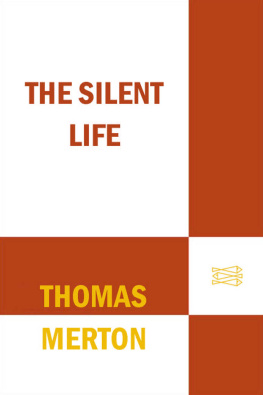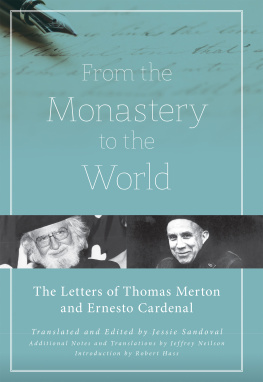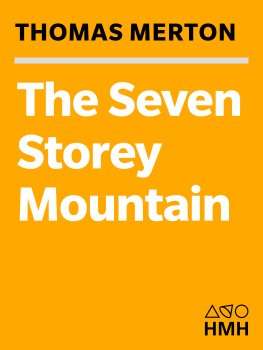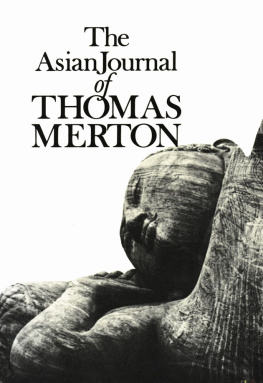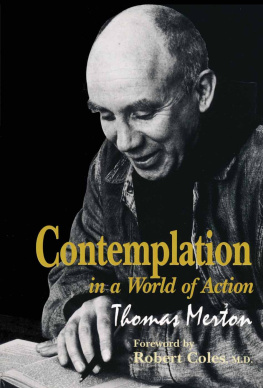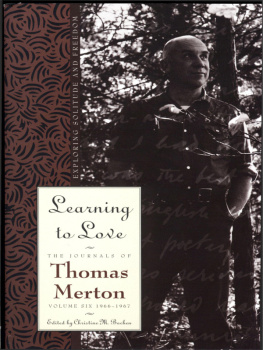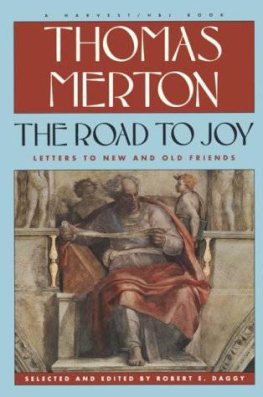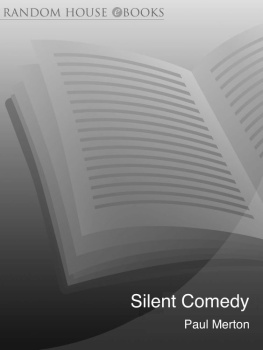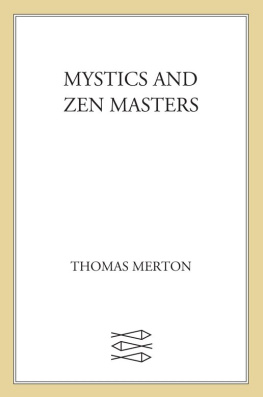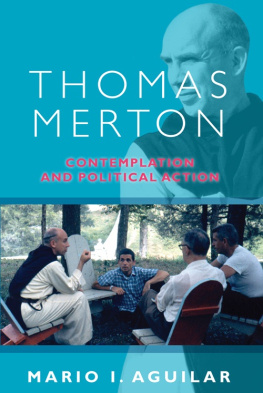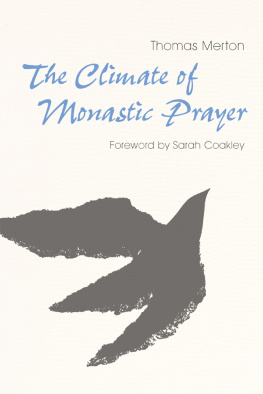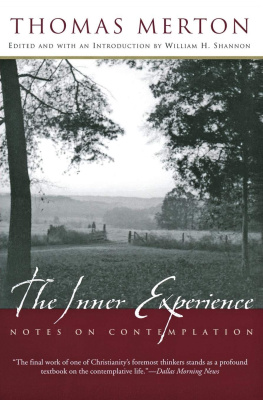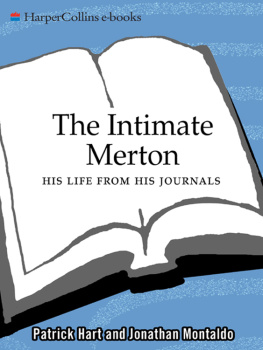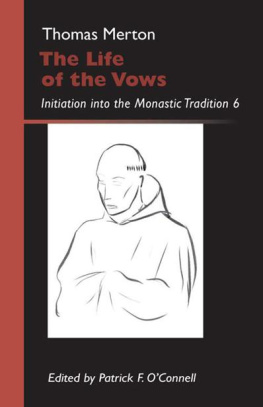THE SILENT LIFE
BY THOMAS MERTON
Bread in the Wilderness
Conjectures of a Guilty Bystander
Contemplation in a World of Action
Disputed Questions
The Living Bread
Love and Living
The Monastic Journey
Mystics and Zen Masters
The New Man
New Seeds of Contemplation
No Man Is an Island
The Nonviolent Alternative
Seasons of Celebration
Seeds of Destruction
The Seven Storey Mountain
The Signs of Jonas
Striving Towards Being:
The Letters of Thomas Merton and Czeslaw Milosz
Thoughts in Solitude
The Waters of Siloe
Zen and the Birds of Appetite
THE
SILENT
LIFE
THOMAS MERTON

Farrar, Straus and Giroux
19 Union Square West, New York 10003
1957 by The Abbey of Our Lady of Gethsemani
All rights reserved
Printed in the United States of America
Library of Congress catalog card number: 56-6164
First published in 1957 by Farrar, Straus and Cudahy
Nineteenth printing, 1999
CONTENTS
PROLOGUE
What Is a Monk?
A monk is a man who has been called by the Holy Spirit to relinquish the cares, desires and ambitions of other men, and devote his entire life to seeking God. The concept is familiar. The reality which the concept signifies is a mystery. For in actual fact, no one on earth knows precisely what it means to seek God until he himself has set out to find Him. No man can tell another what this search means unless that other is enlightened, at the same time, by the Spirit speaking within his own heart. In the end, no one can seek God unless he has already begun to find Him. No one can find God without having first been found by Him. A monk is a man who seeks God because he has been found by God.
In short, a monk is a man of God.
Since all men were created by God that they might find Him, all men are called in some sense to be men of God. But not all are called to be monks. A monk is therefore one who is called to give himself exclusively and perfectly to the one thing necessary for all menthe search for God. It is permissible for others to seek God by a road less direct, to lead a good life in the world, to raise a Christian family. The monk puts these things aside, though they may be good. He travels to God by the direct path, recto tramite. He withdraws from the world. He gives himself entirely to prayer, meditation, study, labor, penance, under the eyes of God. The monk is distinguished even from other religious vocations by the fact that he is essentially and exclusively dedicated to seeking God, rather than seeking souls for God.
Let us face the fact that the monastic vocation tends to present itself to the modern world as a problem and as a scandal.
In a basically religious culture, like that of India, or of Japan, the monk is more or less taken for granted. When all society is oriented beyond the mere transient quest of business and pleasure, no one is surprised that men should devote their lives to an invisible God. In a materialistic culture which is fundamentally irreligious the monk is incomprehensible because he produces nothing. His life appears to be completely useless. Not even Christians have been exempt from anxiety over this apparent uselessness of the monk, and we are familiar with the argument that the monastery is a kind of dynamo which, though it does not produce grace, procures this infinitely precious spiritual commodity for the world.
The first Fathers of monasticism were concerned with no such arguments, valid though they may be in their proper context. The Fathers did not feel that the search for God was something that needed to be defended. Or rather, they saw that if men did not realize in the first place that God was to be sought, no other defence of monasticism would avail with them.
Is God, then, to be sought?
The deepest law in mans being is his need for God, for life. God is Life. In Him was life, and the life was the light of men, and the light shineth in the darkness and the darkness comprehended it not (John 1:5). The deepest need of our darkness is to comprehend the light which shines in the midst of it. Therefore God has given us, as His first commandment: Thou shalt love the Lord thy God with thy whole heart, and with thy whole soul and with all thy strength. The monastic life is nothing but the life of those who have taken the first commandment in deadly earnest, and have, in the words of St Benedict, preferred nothing to the love of Christ.
But Who is God? Where is He? Is Christian monasticism a search for some pure intuition of the Absolute? A cult of the supreme Good? A worship of perfect and changeless Beauty? The very emptiness of such abstractions strikes the heart cold. The Holy One, the Invisible, the Almighty is infinitely greater and more real than any abstraction of mans devising. But He has said: No one shall see me and live (Exodus 33:20). Yet the monk persists in crying out with Moses: Show me Thy face (Exodus 33:13).
The monk, then, is one who is so intent upon the search for God that he is ready to die in order to see Him. That is why the monastic life is a martyrdom as well as a paradise, a life that is at once angelic and crucified.
St Paul resolves the problem: God who commanded the light to shine out of darkness, hath shined in our hearts to give the light of the knowledge of the glory of God, in the face of Christ Jesus (2 Corinthians 4:6).
The monastic life is the rejection of all that obstructs the spiritual rays of this mysterious light. The monk is one who leaves behind the fictions and illusions of a merely human spirituality in order to plunge himself in the faith of Christ. Faith is the light which illumines him in mystery. Faith is the power which seizes upon the inner depths of his soul and delivers him up to the action of the divine Spirit, the Spirit of liberty, the Spirit of love. Faith takes him, as the power of God took the ancient prophets, and stands him upon his feet (Ezechiel 2:2) before the Lord. The monastic life is life in the Spirit of Christ, a life in which the Christian gives himself entirely to the love of God which transforms him in the light of Christ.
The Lord is a Spirit, and where the Spirit of the Lord is, there is liberty. But we all, beholding the glory of the Lord with open face, are transformed into the same image from glory to glory, as by the Spirit of the Lord (Corinthians 3:17-18). What St Paul has said of the inner life of every Christian becomes in all truth the main objective of the monk, living in his solitary cloister. In seeking Christian perfection the monk seeks the fullness of the Christian life, the complete maturity of Christian faith. For him, to live is Christ.
In order to be free with the freedom of the children of God, the monk gives up his own will, his power to own property, his love of ease and comfort, his pride, his right to raise a family, his freedom to dispose of his time as he pleases, to go where he likes and to live according to his own judgment. He lives alone, poor, in silence. Why? Because of what he believes. He believes the word of Christ, Who has promised: There is no man who has left house or parents or brethren or wife or children for the Kingdom of Gods sake, who shall not receive much more in this present time, and in the world to come life everlasting (Luke 18:29-30).
This book is a meditation on the monastic life by one who, without any merit of his own, is privileged to know that life from the inside. If there is anything of value in these pages, it comes from no special talent of the author, who seeks only to speak as the mouthpiece of a tradition centuries old, and as an unworthy descendent of St Benedict and the First Apostles, to whom all monks look back as their spiritual Fathers.
Next page
